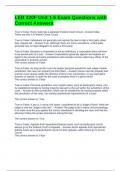LEB 320F Unit 1-5 Exam Questions with
Correct Answers
True or False: Every state has a separate Federal Court Circuit - Answer-False.
There are only 13 Federal Circuit Courts
True or False: Individuals are generally not required by law to help a third party when
they request aid. - Answer-True. Although there are many exceptions, a third party
generally has no legal obligation to assist a third party.
True of False: Because a corporation is not an individual, a corporation does not have
to be served prior to a suit. - Answer-Corporations generally appoint and register an
agent to be served and some jurisdictions will consider service valid if any officer of the
corporation is properly served.
The correct answer is: False
True of False: As long as the court has proper personal jurisdiction and subject matter
jurisdiction, the case can properly be tried there. - Answer-Venue must be properly laid
and the court cannot violate the doctrine of forum non conveniens, or any equivalent
doctrine or statute, in order for the case to properly tried in a given forum.
The correct answer is: False
True or False: Personal jurisdiction over certain cases, such as bankruptcy cases, can
be established simply by having property relevant to the suit within the jurisdiction of the
court. - Answer-In Rem jurisdiction, which can be established by having property within
the jurisdiction of the court, can satisfy jurisdictional requirements for a case.
The correct answer is: True
True or False: A jury is, in most civil cases, considered to be a "judge of facts" while the
judge is only the "judge of the law". - Answer-The judge's job in many civil proceedings
is to make sure the jury applies the correct standards in deciding the case and that the
attorneys follow the proper procedures during the trial.
The correct answer is: True
True or False: Appeals from specialized federal courts, such as bankruptcy courts
always go to the Federal Court of Appeals. - Answer-Some appeals from specialized
federal courts go to federal district courts for their appeals, while others go to Circuit
Courts.
The correct answer is: False
, True or False: When an equitable claim and a legal claim are tried together, both claims
are determined purely by the judge. - Answer-When an equitable and a legal claim are
tried together, the jury makes the determination regarding the legal claim.
The correct answer is: False
True or False: Johnny, a citizen of Texas, and Ash, a citizen of Texas, sue AJ, a citizen
of Alabama, and Jeff, a citizen of Florida, for $100,000 from a claim arising from state
law. This case can be brought in federal court. - Answer-Diversity of Citizenship allows
for a case to brought in Federal Court when there is diversity of residency between
parties and the claim is for at least $75,000. The residency requirement only applies
when opposing parties are from the same jurisdiction.
The correct answer is: True
True or False: Casey, while working for the corporation B12, injures David. This injury is
the result of Casey acting outside his scope of employment. Regardless, B12 can be
held liable for Casey's actions. - Answer-An employer generally can be held liable for
the actions of an employee if the actions of the employee was within the scope of
employment.
The correct answer is: False
True or False: An effective manager of a corporation should not attempt to alter political
situations. - Answer-An effective manager will attempt to alter political situations and
regulations to aid their company.
The correct answer is: False
True or False: Johnny, a citizen of Texas, and Teddy, a citizen of Kentucky, sue Ash, a
citizen of Texas, and Aaron, a citizen of Georgia for $125,000 from a claim arising from
state law. This suit can be brought in Federal Court. - Answer-Because Johnny and Ash
are both from Texas, the requirements for diversity jurisdiction are not met. Diversity
Jurisdiction requires the claim be worth at least $75000 and that no defendant have the
same state of residency as any of the plaintiffs.
The correct answer is: False
True or False: Johnny, a citizen of Texas, sues USC, a corporation incorporated in
California with a principle place of business in Texas, for $2.5 million on a claim arising
from state law. This suit can be brought in Federal Court. - Answer-Corporations are
considered to be citizens of both the state in which they are incorporated in and where
their principle place of business is. Because USC's principle place of business is in
Texas and Johnny is a citizen of Texas, diversity jurisdiction cannot be established.
The correct answer is: False
True or False: Jordan files a class action suit against MAC. The total value of the class
action suit will likely be greater than $5 million, but Jordan stipulates that the class will
not seek damages in excess of $5 million. MAC cannot remove the case to federal
court. - Answer-Under CAFA, simply stipulating that a class will not have damages
exceeding $5 million does not preclude the defendant from removing the case to federal




